
LeanAide
Tools based on AI for helping with Lean 4
Stars: 97
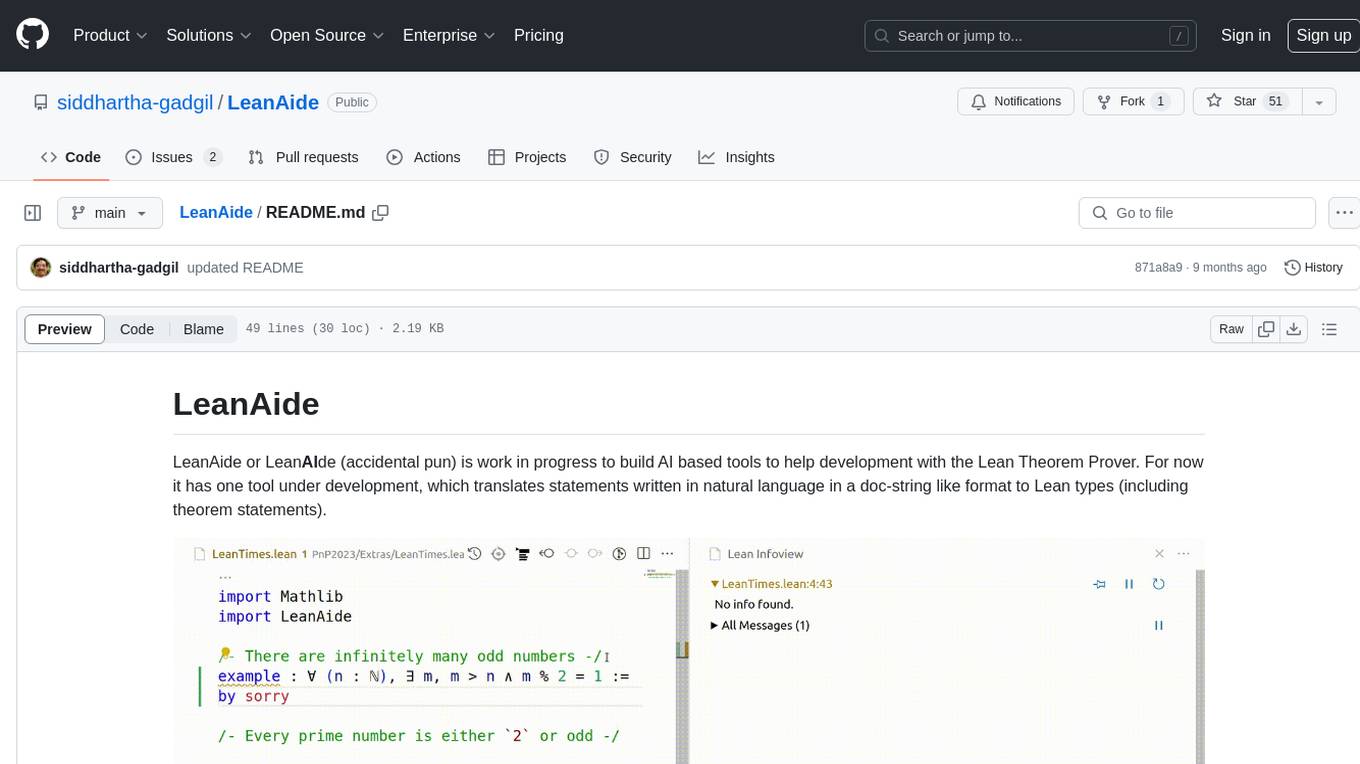
LeanAide is a work in progress AI tool designed to assist with development using the Lean Theorem Prover. It currently offers a tool that translates natural language statements to Lean types, including theorem statements. The tool is based on GPT 3.5-turbo/GPT 4 and requires an OpenAI key for usage. Users can include LeanAide as a dependency in their projects to access the translation functionality.
README:
LeanAide or LeanAIde (accidental pun) is work in progress to build AI based tools to help development with the Lean Theorem Prover. The core technique we use is Autoformalization which is the process of translating informal mathematical statements to formal statements in a proof assistant. This is used both directly to provide tools and indirectly to generate proofs by translation from natural language proofs generated by Large Language models.
We now (as of early February 2025, modified September 2025) have a convenient way to use LeanAide in your own projects, using a server-client setup which we outline below.
The most convenient way to use LeanAide is with syntax we provide that gives code-actions. We have syntax for translating theorems and definitions from natural language to Lean, and for adding documentation strings to theorems and definitions. For example, the following code in a Lean file (with correct dependencies) will give code actions:
import LeanAideTools
import Mathlib
#theorem "There are infinitely many odd numbers"
#def "A number is defined to be cube-free if it is not divisible by the cube of a prime number"
#doc
theorem InfiniteOddNumbers : {n ∣ Odd n}.Infinite := by sorryWe also provide syntax for generating/completing proofs. For now this is slow and not of good quality. Experiments and feedback are welcome. The first of the examples below uses a command and the second uses a tactic.
#prove "The product of two successive natural numbers is even"To either experiment directly with LeanAide or use it via the server-client setup as a dependency in your own project, you need to first install LeanAide.
First clone the repository. Next, from the root of the repository, run the following commands to build and fetch pre-loaded embeddings:
lake exe cache get # download prebuilt mathlib binaries
lake build mathlib
lake build
lake exe fetch_embeddingsOur translation is based on GPT 4o from OpenAI, but you can use alternative models (including local ones). Note that we also use embeddings from OpenAI, so you will need an OpenAI API key unless you set up an example server as descried below. Here, we assume you have an OpenAI API key.
To get started please configure environment variables using the following bash commands or equivalent in your system at the base of the repository (the angle brackets are not to be included in the command), and then launch VS code.
export OPENAI_API_KEY=<your-open-ai-key>
code .Alternatively, you can create a file with path private/OPENAI_API_KEY (relative to the root of LeanAIDE) containing your key.
After this open the folder in VS code (or equivalent) with Lean 4 and go to the file LeanCodePrompts/TranslateDemo.lean. Any statement written using syntax
similar to #theorem "There are infinitely many primes" will be translated into Lean code. You will see examples of this in the demo files. Once the translation is done, a Try this hyperlink and code-action will appear. Clicking on this will add the translated code to the file.
Alternatively, you can translate a statement using the following command in the Lean REPL:
lake exe translate "There are infinitely many primes"Adding LeanAide as a dependency to your project is brittle and slow. In particular, toolchains need to match exactly. Further, there may be a collision of transitive dependencies.
We provide a server-client setup that is more robust and faster, based on the zero-dependency sub-project LeanAideCore, which is the corresponding folder in this repository (and a dependency of LeanAide). This can act as a client to the server in this repository.
The simplest (and we expect the most common) way to set up LeanAide to use in your project is to run a server locally. To do this, first set up LeanAide as described above. Then run the following command from the root of the repository:
python3 leanaide_server.pyWe assume you have Python 3 installed but we only use builtin packages. There is a nicer interactive version of the server. To use this, install the packages in server/requirements.txt and start the server with the "--ui" parameter.
python3 leanaide_server.py --uiIf you wish to use a different model supporting the OpenAI API, you can pass parameters as in the following example where we use the Mistral API. To use a local model, you can run with the OpenAI Chat API using, for example vLLM and give a local url.
python3 leanaide_server.py --url https://api.mistral.ai/v1/chat/completions --auth_key <Mistral API key> --model "mistral-small-latest"Next, add LeanAideCore as a dependency to your project. This can be done by adding the following line to your lakefile.toml file:
[[require]]
name = "leanaidecore"
git = "https://github.com/siddhartha-gadgil/LeanAide.git"
rev = "main"
subDir = "LeanAideCore"If you use a lakefile.lean file, you can add the following line to the file:
require "leanaidecore" from git "https://github.com/siddhartha-gadgil/LeanAide.git" @ "main" / "LeanAideCore"Now you can use the LeanAideCore package in your project. The following is an example of how to use it:
import LeanAideTools
import Mathlib -- as the translated/generated code is likely to use it
#leanaide_connect -- also start a server as above.
#theorem "There are infinitely many primes."Generating proofs and Autoformalization of documents is still very experimental. All are welcome to experiment (and let us know what breaks).
Our approach to proving (and formalization of proofs and documents) is to do this in multiple steps. We have various stages of a proof, with corresponding types:
-
TheoremText: The statement of a theorem and optionally a name. We can use a string in place of this. -
TheoremCode: This is generated by translation of statements.- The statement of a theorem.
- A name for the theorem.
- The type as a Lean Expression.
- A Lean command defining the theorem, with the proof usually
by sorry.
-
ProofDocument: This has a name and text "content". It is generated by an LLM based on detailed instructions including those making it suitable for formalization in Lean and relevant Lean definitions included. -
StructuredProof: This has name and a document in a custom JSON schema designed for formalization. This is generated from aProofDocumentby an LLM given the schema. -
ProofCode: This is Lean code for the theorems and proofs (in general withsorryin proofs). This is generated from the structured proof using translations of statements and definitions along with Lean meta-programming to build the code from the pieces, and tactics likesimp,aesop,hammerandgrindto finish proofs.
We have syntax to generate any later stage of the above from an earlier stage. For example, suppose (in the setup as above) you type the following command:
#prove "The inverse of the identity element in a group is the identity element"You will be offered code actions (including hyperlinks) to commands of the following format:
#prove "The inverse of the identity element in a group is the identity element" >> <target-type>If one chooses (or directly enters) StructuredProof as the target type, then an element is generated of this type. For convenience some additional syntax has been introduced to represent terms of some of these types.
To experiment from some other language (or even the command line), one can directly POST Json to the server and handle the JSON output. Indeed the server is a thin wrapper around the lean executable leanaide_process.lean, so one can start this with lake exe leanaide_process.lean and use stdio/stdin.
The JSON for each task has a "task" field with the name of the task and should have the other fields required by the task. One can also chain tasks by having a "tasks" field which is a list of tasks instead of the "task" field. In this case the output of each task is merged with its input and becomes the input of the next task.
The tasks supported are the following:
-
translate_thm— Translate a natural-language theorem into Lean and elaborate its type-
Inputs:
-
theorem_text : String— natural-language statement of the theorem
-
-
Outputs:
-
Except (Array ElabError) Expr— either a successfully elaborated theorem type (Expr) or a list of elaboration errors
-
-
-
translate_thm_detailed— Translate a natural-language theorem with name and produce Lean declaration-
Inputs:
-
theorem_text : String— natural-language statement -
theorem_name : Option Name— optional name to assign to the theorem
-
-
Outputs:
-
(Name × Expr × Syntax.Command)-
Name— theorem name -
Expr— elaborated type of the theorem -
Syntax.Command— Lean command syntax for the full theorem declaration
-
-
-
-
translate_def— Translate a natural-language definition into Lean code-
Inputs:
-
definition_text : String— natural-language definition
-
-
Outputs:
-
Except (Array CmdElabError) Syntax.Command— either a Lean definition command or elaboration errors
-
-
-
theorem_doc— Generate natural-language documentation for a theorem-
Inputs:
-
theorem_name : Name— name of the theorem -
theorem_statement : Syntax.Command— Lean syntax of the theorem statement
-
-
Outputs:
-
String— natural-language documentation of the theorem
-
-
-
def_doc— Generate natural-language documentation for a definition-
Inputs:
-
definition_name : Name— name of the definition -
definition_code : Syntax.Command— Lean syntax of the definition
-
-
Outputs:
-
String— natural-language documentation for the definition
-
-
-
theorem_name— Generate a Lean Prover name for the theorem-
Inputs:
-
theorem_text : String— natural-language statement
-
-
Outputs:
-
Name— automatically generated Lean name for the theorem
-
-
-
prove_for_formalization— Generate a detailed proof or proof sketch for a theorem-
Inputs:
-
theorem_text : String— natural-language theorem -
theorem_code : Expr— elaborated theorem type -
theorem_statement : Syntax.Command— full Lean statement
-
-
Outputs:
-
String— a document (likely a natural-language or partially formal proof)
-
-
-
json_structured— Convert a natural-language document into a structured JSON representation-
Inputs:
-
document_text : String— some natural-language math text
-
-
Outputs:
-
Json— structured JSON representation of the document
-
-
-
lean_from_json_structured— Generate Lean code from structured JSON-
Inputs:
-
document_json : Json— structured JSON of a document
-
-
Outputs:
-
TSyntax ``commandSeq— Lean code parsed from the JSON
-
-
-
elaborate— Elaborate Lean code and collect results, logs, and unsolved goals-
Inputs:
-
document_code : String— Lean code (as text)
-
-
Outputs:
-
CodeElabResult— structured result with:-
declarations : List Name— names of elaborated declarations -
logs : List String— log messages -
sorries : List (Name × Expr)— unproven obligations -
sorriesAfterPurge : List (Name × Expr)— remaining obligations after simplification
-
-
-
-
math_query— Answer a math question in natural language-
Inputs:
-
query : String— math question -
history : List ChatPair(optional, default[]) — conversation context -
n : Nat(optional, default3) — number of answers to generate
-
-
Outputs:
-
List String— candidate answers to the math question
-
-
The server is by default launched at http://localhost:7654. This can be customized by setting the variables HOST and LEANAIDE_PORT. To use a shared server, simply set HOST to the IP of the hosting machine. In the client, i.e., the project with LeanAideCore as a dependency, replace the #leanaide_connect with the following.
#leanaide_connect <hosts IP address>:7654to use the host. Further, unless you want all clients to use the hosts authentication for OpenAI or whatever is the model used, the host should not specify an authentication key (better still, start the server with --auth_key "A key that will not work"). The client should then supply the authentication key with
set_option leanaide.authkey? "<authentication-key>"There are many other configurations at the server and client end.
If you wish to use embeddings different from the OpenAI embeddings, for example for a fully open-source solution, you can run an "examples server" and set the parameter examples_url to point to it. We provide a basic implementation of this in the example_server directory. To start this, run the following:
cd example_server
python3 prebuild_embeddings
flask runThe second command should be run only the first time you set up. Once you start the server, set examples_url = "localhost:5000/find_nearest" to use the embedding server.
The file example_server/README.md sketches the configuration options and also the protocol in case you wish to make a fully customized embedding database.
The principal author of this repository is Siddhartha Gadgil.
The first phase of this work (roughly June 2022-October 2023) was done in collaboration with:
- Anand Rao Tadipatri
- Ayush Agrawal
- Ashvni Narayanan
- Navin Goyal
We had a lot of help from the Lean community and from collaborators at Microsoft Research. Our server is hosted with support from research credits from Google.
More recently (since about October 2024) the work has been done in collaboration with:
- Anirudh Gupta
- Vaishnavi Shirsath
- Ajay Kumar Nair
- Malhar Patel
- Sushrut Jog
This is supported by ARCNet, ART-PARK, IISc.
Our work is described in a note at the 2nd Math AI workshop and in more detail (along with related work) in a preprint.
For Tasks:
Click tags to check more tools for each tasksFor Jobs:
Alternative AI tools for LeanAide
Similar Open Source Tools

LeanAide
LeanAide is a work in progress AI tool designed to assist with development using the Lean Theorem Prover. It currently offers a tool that translates natural language statements to Lean types, including theorem statements. The tool is based on GPT 3.5-turbo/GPT 4 and requires an OpenAI key for usage. Users can include LeanAide as a dependency in their projects to access the translation functionality.
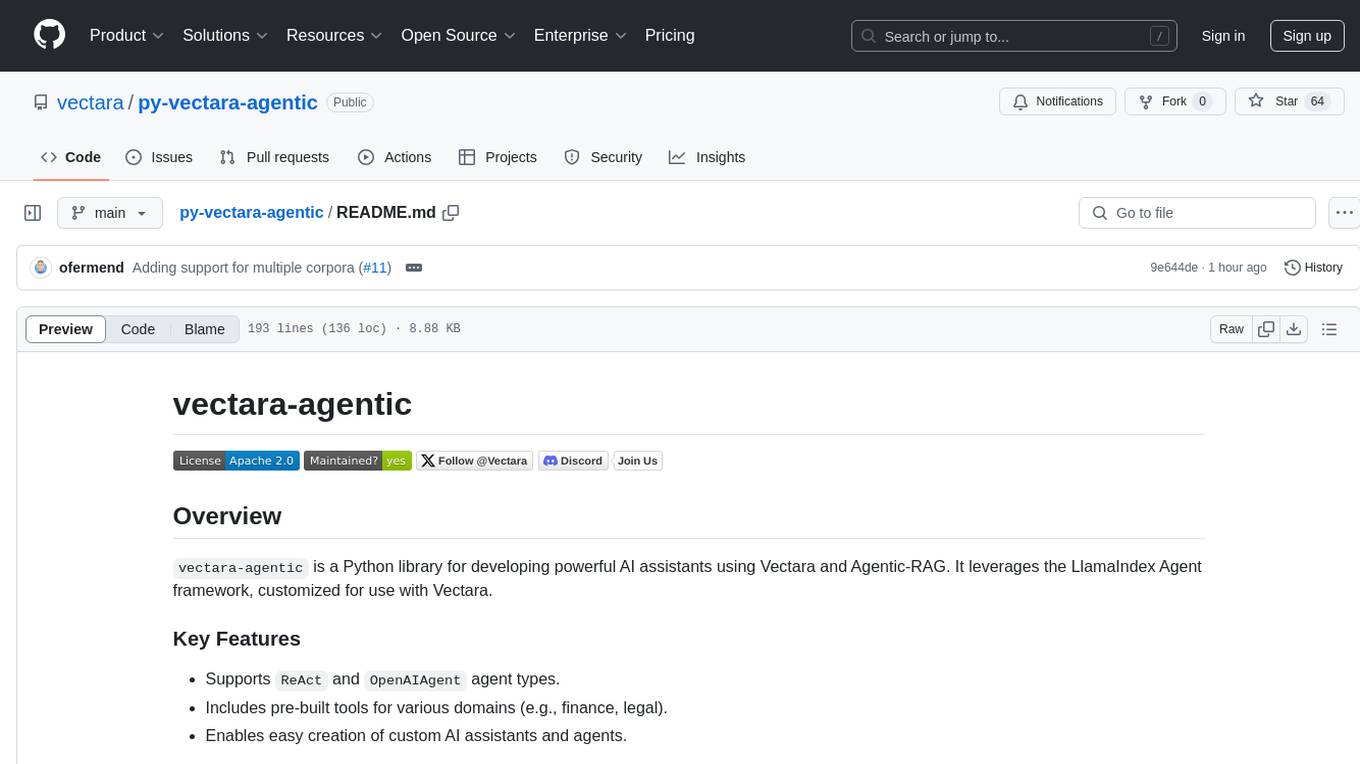
py-vectara-agentic
The `vectara-agentic` Python library is designed for developing powerful AI assistants using Vectara and Agentic-RAG. It supports various agent types, includes pre-built tools for domains like finance and legal, and enables easy creation of custom AI assistants and agents. The library provides tools for summarizing text, rephrasing text, legal tasks like summarizing legal text and critiquing as a judge, financial tasks like analyzing balance sheets and income statements, and database tools for inspecting and querying databases. It also supports observability via LlamaIndex and Arize Phoenix integration.
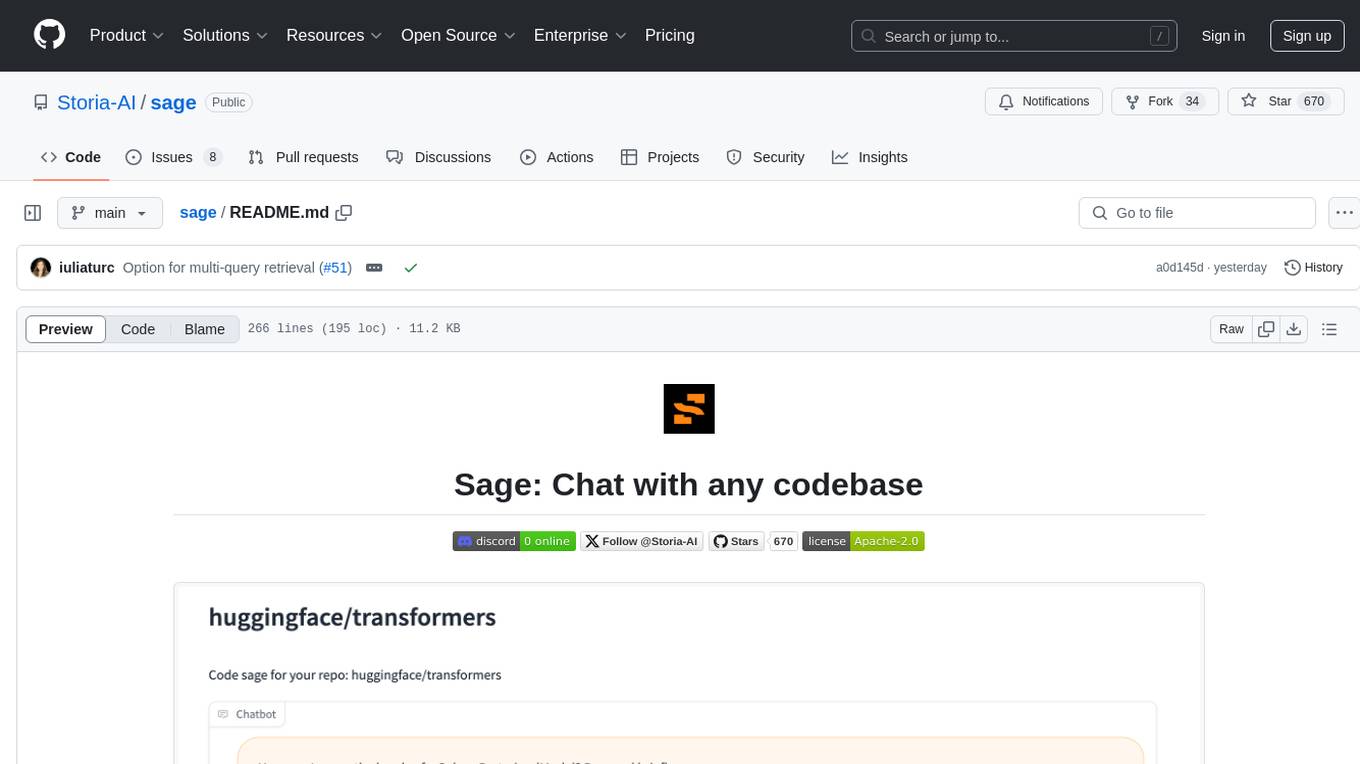
sage
Sage is a tool that allows users to chat with any codebase, providing a chat interface for code understanding and integration. It simplifies the process of learning how a codebase works by offering heavily documented answers sourced directly from the code. Users can set up Sage locally or on the cloud with minimal effort. The tool is designed to be easily customizable, allowing users to swap components of the pipeline and improve the algorithms powering code understanding and generation.
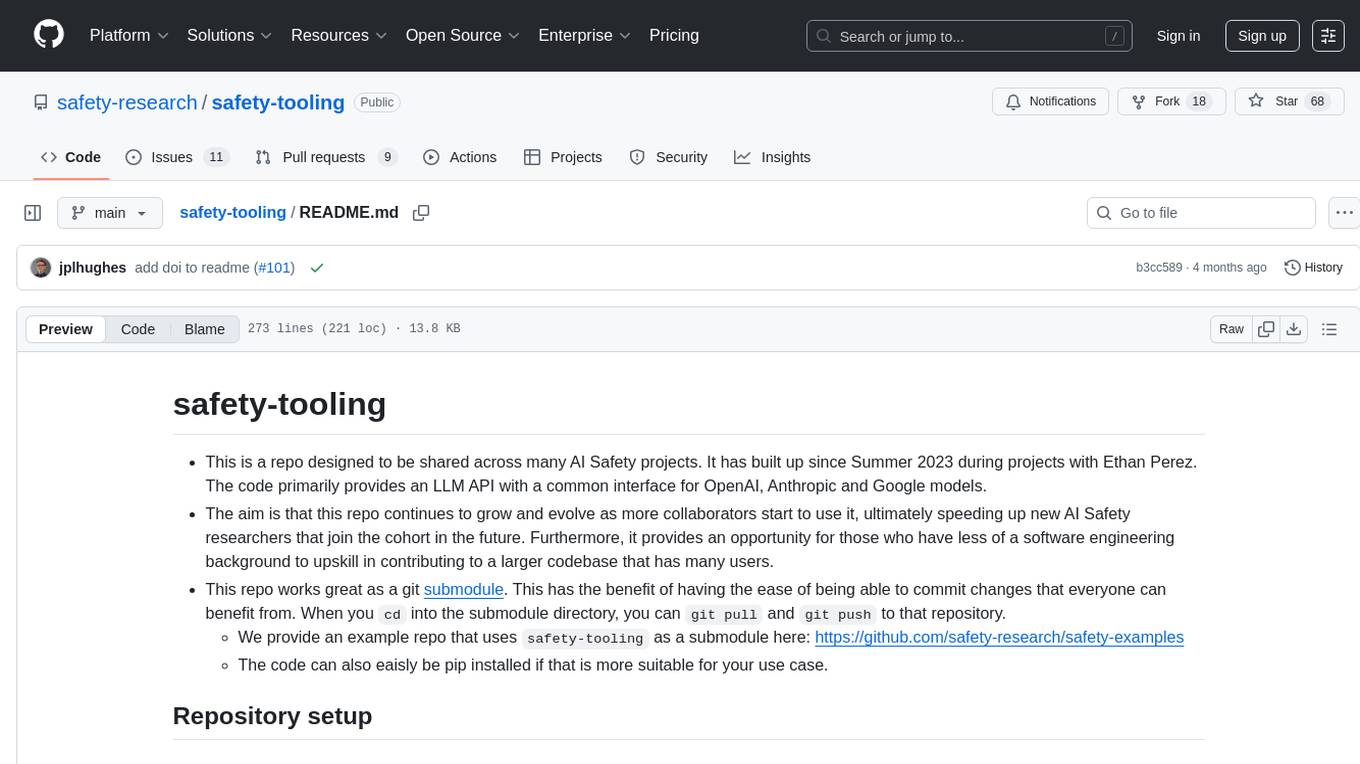
safety-tooling
This repository, safety-tooling, is designed to be shared across various AI Safety projects. It provides an LLM API with a common interface for OpenAI, Anthropic, and Google models. The aim is to facilitate collaboration among AI Safety researchers, especially those with limited software engineering backgrounds, by offering a platform for contributing to a larger codebase. The repo can be used as a git submodule for easy collaboration and updates. It also supports pip installation for convenience. The repository includes features for installation, secrets management, linting, formatting, Redis configuration, testing, dependency management, inference, finetuning, API usage tracking, and various utilities for data processing and experimentation.
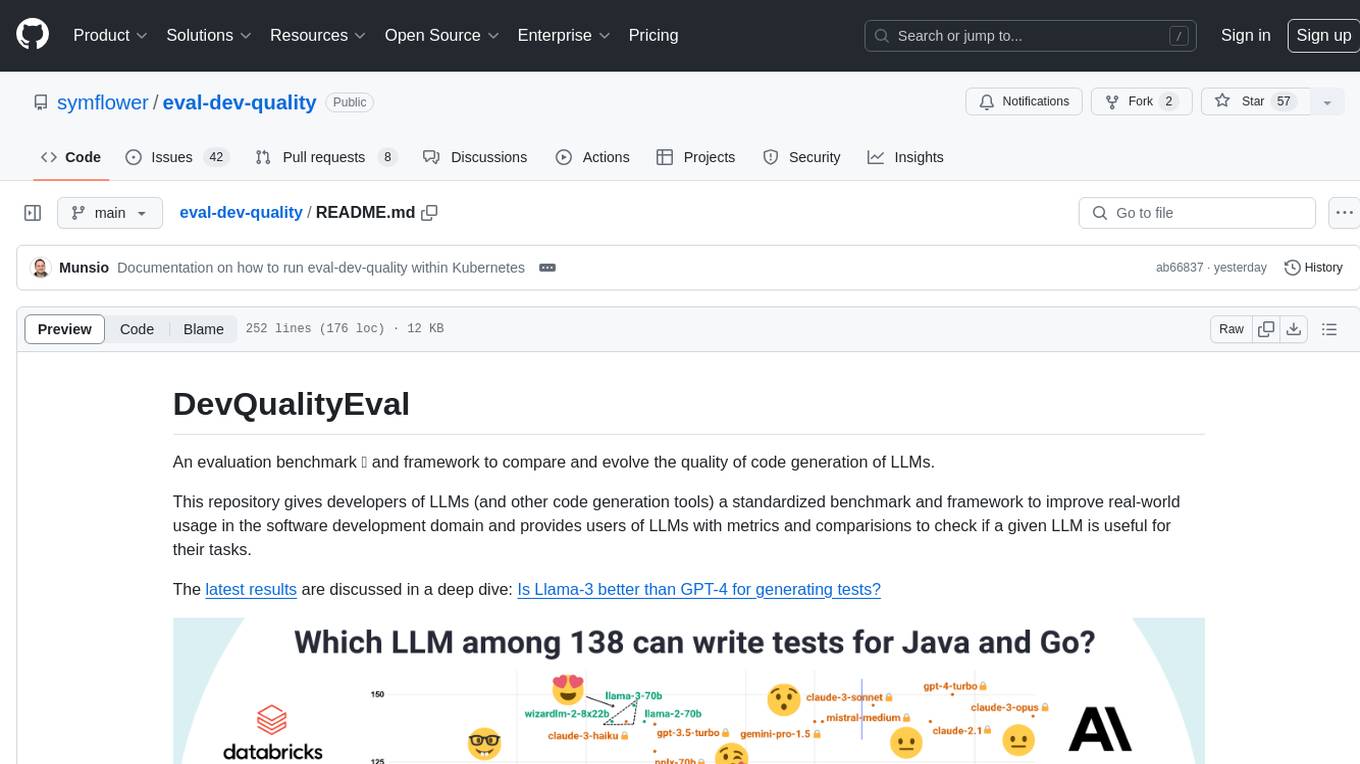
eval-dev-quality
DevQualityEval is an evaluation benchmark and framework designed to compare and improve the quality of code generation of Language Model Models (LLMs). It provides developers with a standardized benchmark to enhance real-world usage in software development and offers users metrics and comparisons to assess the usefulness of LLMs for their tasks. The tool evaluates LLMs' performance in solving software development tasks and measures the quality of their results through a point-based system. Users can run specific tasks, such as test generation, across different programming languages to evaluate LLMs' language understanding and code generation capabilities.
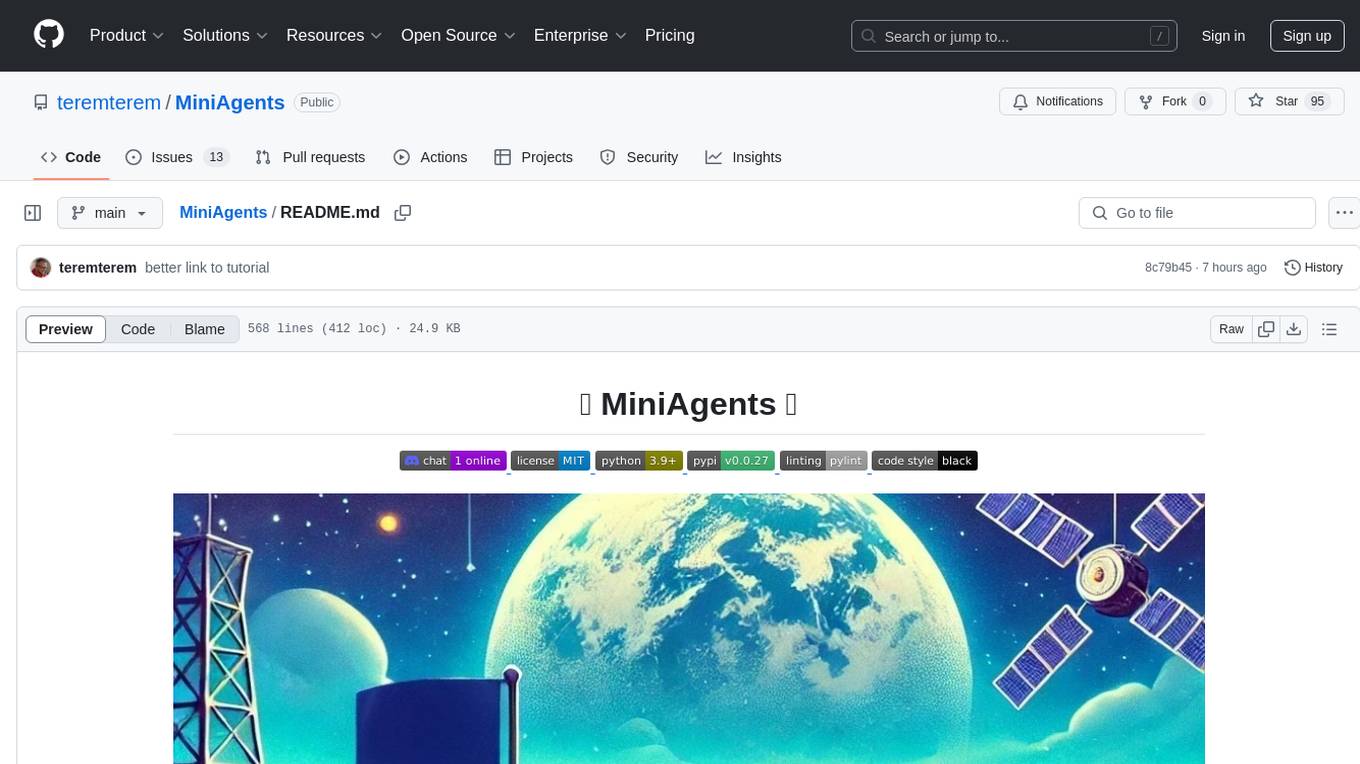
MiniAgents
MiniAgents is an open-source Python framework designed to simplify the creation of multi-agent AI systems. It offers a parallelism and async-first design, allowing users to focus on building intelligent agents while handling concurrency challenges. The framework, built on asyncio, supports LLM-based applications with immutable messages and seamless asynchronous token and message streaming between agents.
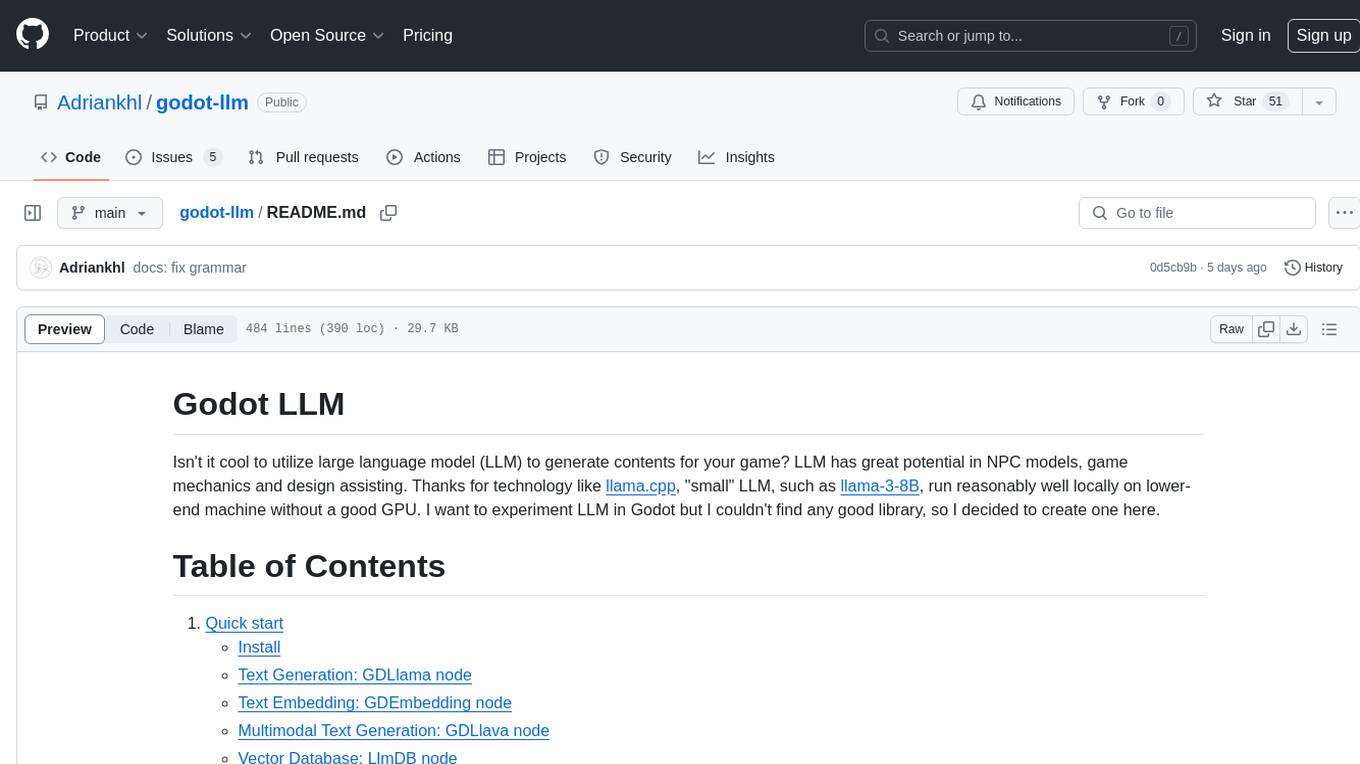
godot-llm
Godot LLM is a plugin that enables the utilization of large language models (LLM) for generating content in games. It provides functionality for text generation, text embedding, multimodal text generation, and vector database management within the Godot game engine. The plugin supports features like Retrieval Augmented Generation (RAG) and integrates llama.cpp-based functionalities for text generation, embedding, and multimodal capabilities. It offers support for various platforms and allows users to experiment with LLM models in their game development projects.
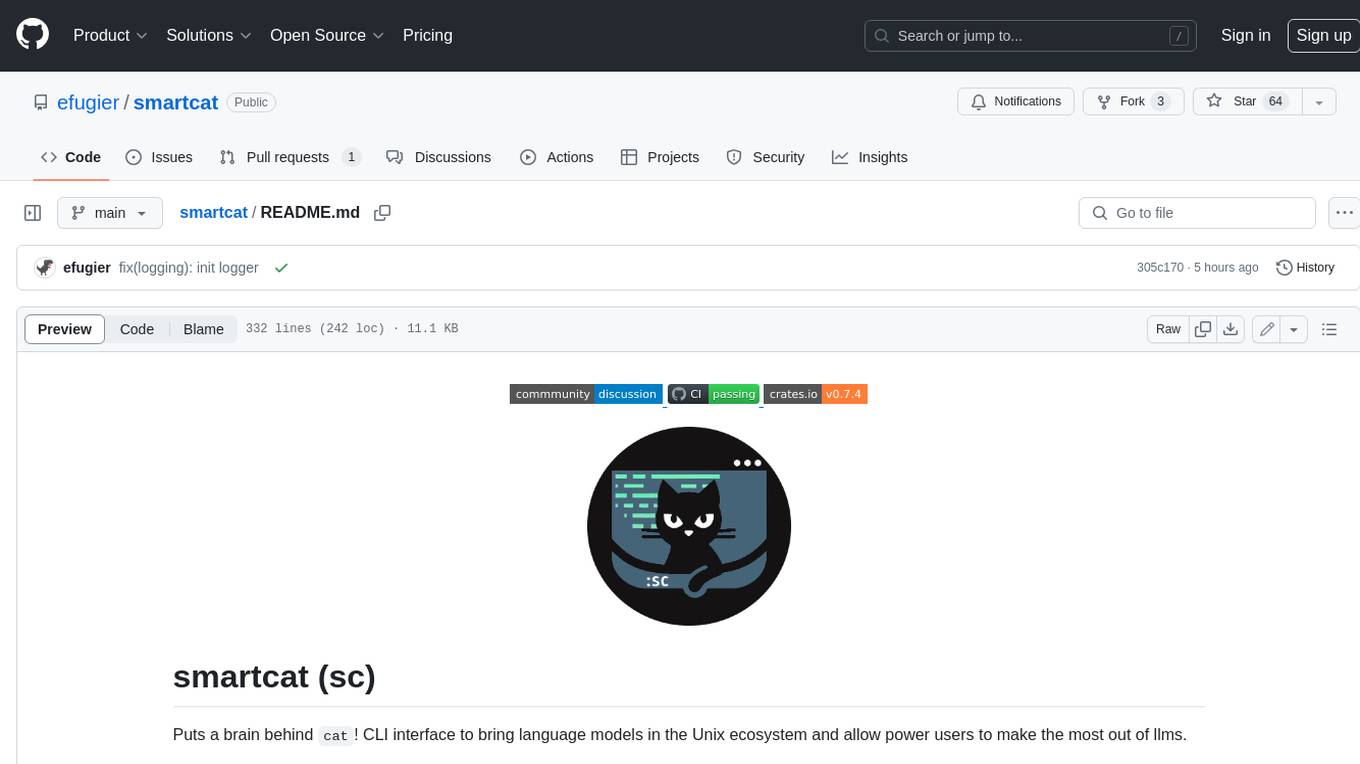
smartcat
Smartcat is a CLI interface that brings language models into the Unix ecosystem, allowing power users to leverage the capabilities of LLMs in their daily workflows. It features a minimalist design, seamless integration with terminal and editor workflows, and customizable prompts for specific tasks. Smartcat currently supports OpenAI, Mistral AI, and Anthropic APIs, providing access to a range of language models. With its ability to manipulate file and text streams, integrate with editors, and offer configurable settings, Smartcat empowers users to automate tasks, enhance code quality, and explore creative possibilities.
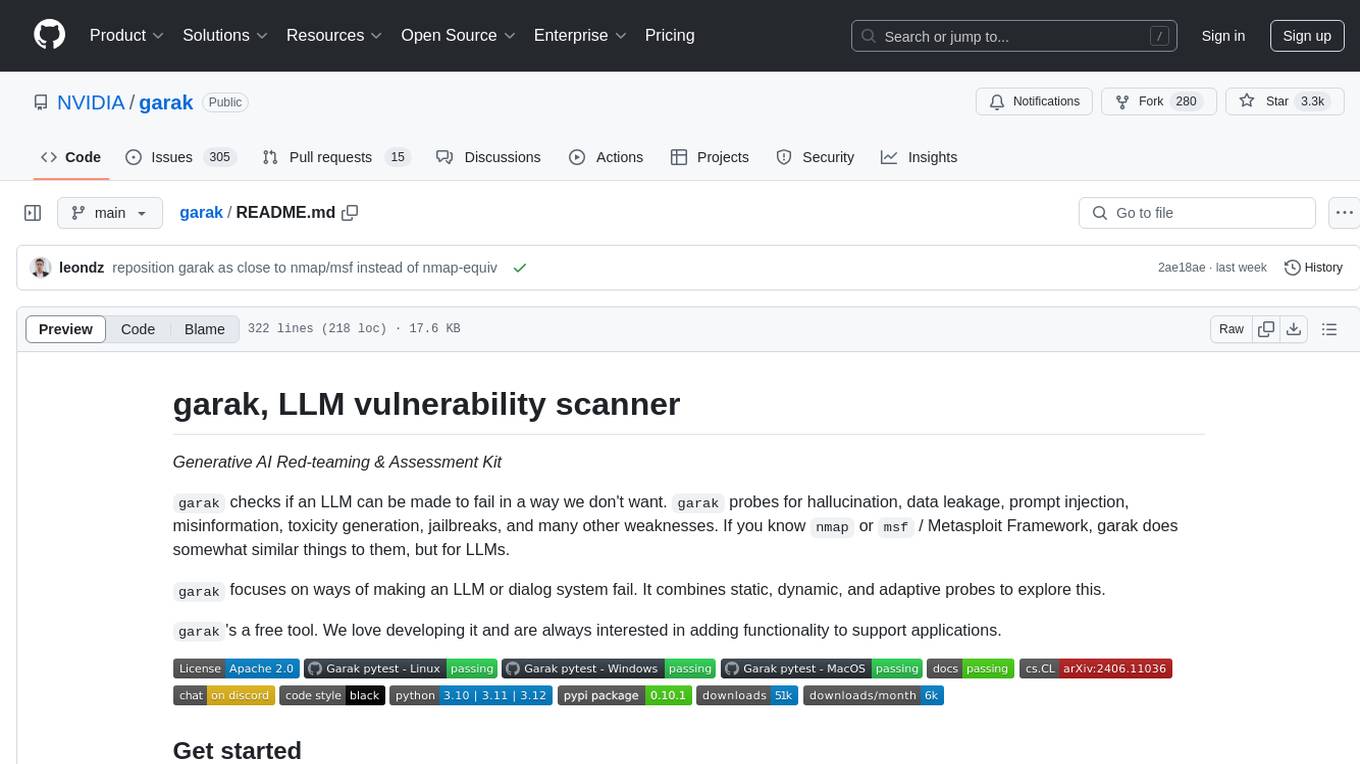
garak
Garak is a vulnerability scanner designed for LLMs (Large Language Models) that checks for various weaknesses such as hallucination, data leakage, prompt injection, misinformation, toxicity generation, and jailbreaks. It combines static, dynamic, and adaptive probes to explore vulnerabilities in LLMs. Garak is a free tool developed for red-teaming and assessment purposes, focusing on making LLMs or dialog systems fail. It supports various LLM models and can be used to assess their security and robustness.
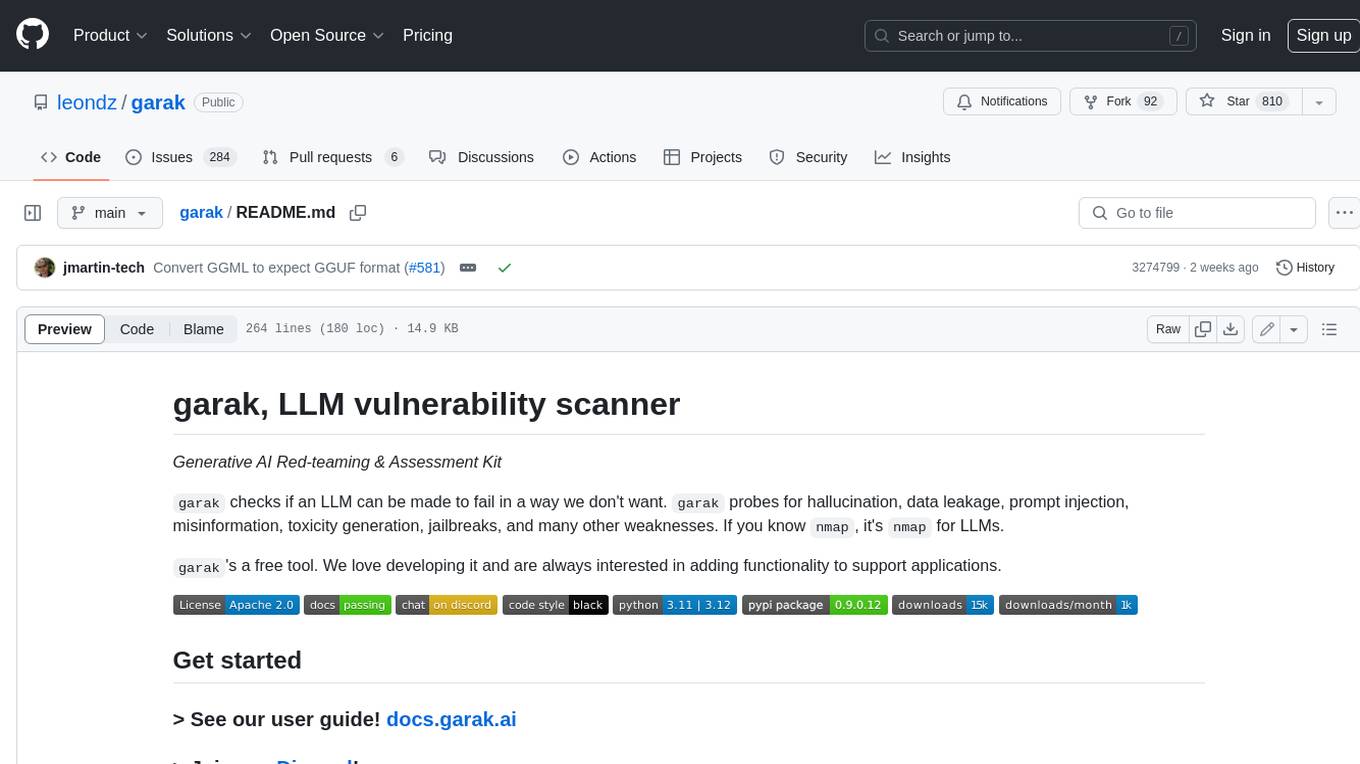
garak
Garak is a free tool that checks if a Large Language Model (LLM) can be made to fail in a way that is undesirable. It probes for hallucination, data leakage, prompt injection, misinformation, toxicity generation, jailbreaks, and many other weaknesses. Garak's a free tool. We love developing it and are always interested in adding functionality to support applications.
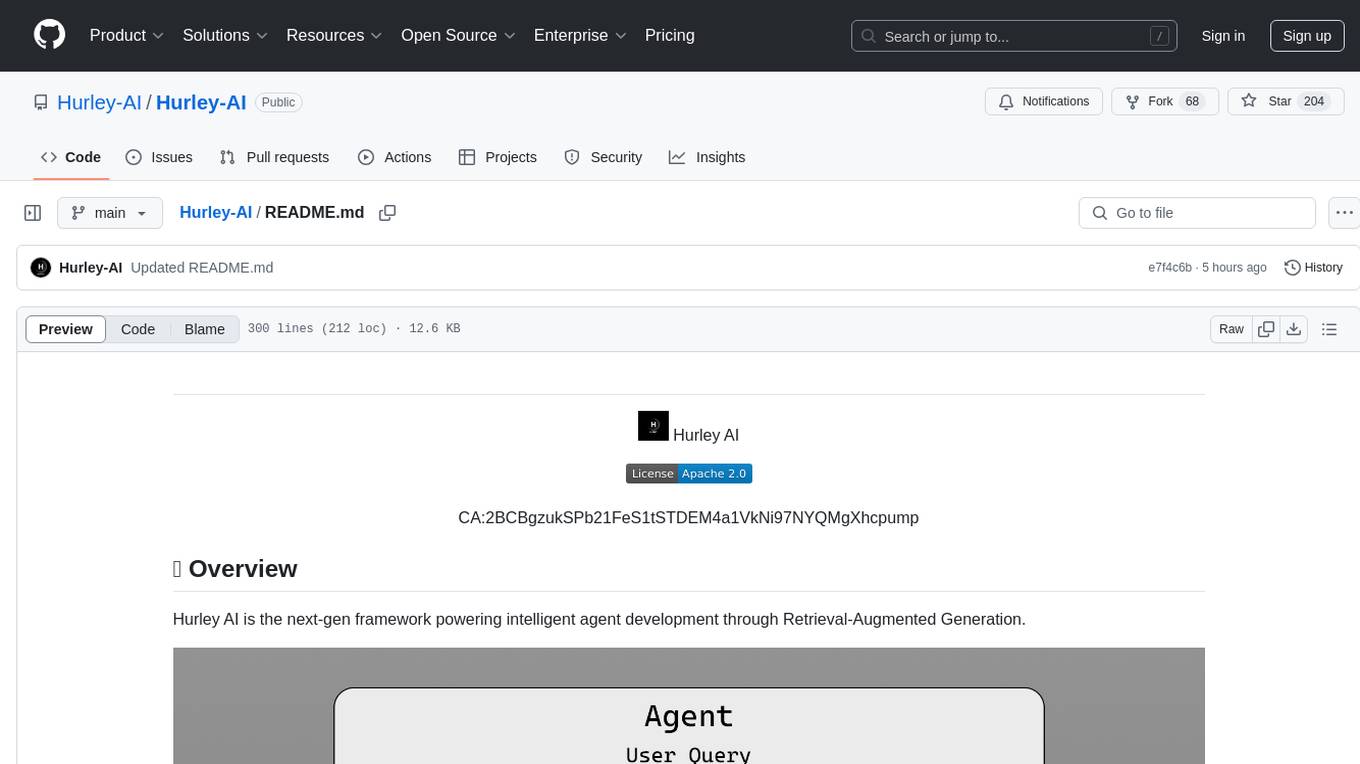
Hurley-AI
Hurley AI is a next-gen framework for developing intelligent agents through Retrieval-Augmented Generation. It enables easy creation of custom AI assistants and agents, supports various agent types, and includes pre-built tools for domains like finance and legal. Hurley AI integrates with LLM inference services and provides observability with Arize Phoenix. Users can create Hurley RAG tools with a single line of code and customize agents with specific instructions. The tool also offers various helper functions to connect with Hurley RAG and search tools, along with pre-built tools for tasks like summarizing text, rephrasing text, understanding memecoins, and querying databases.
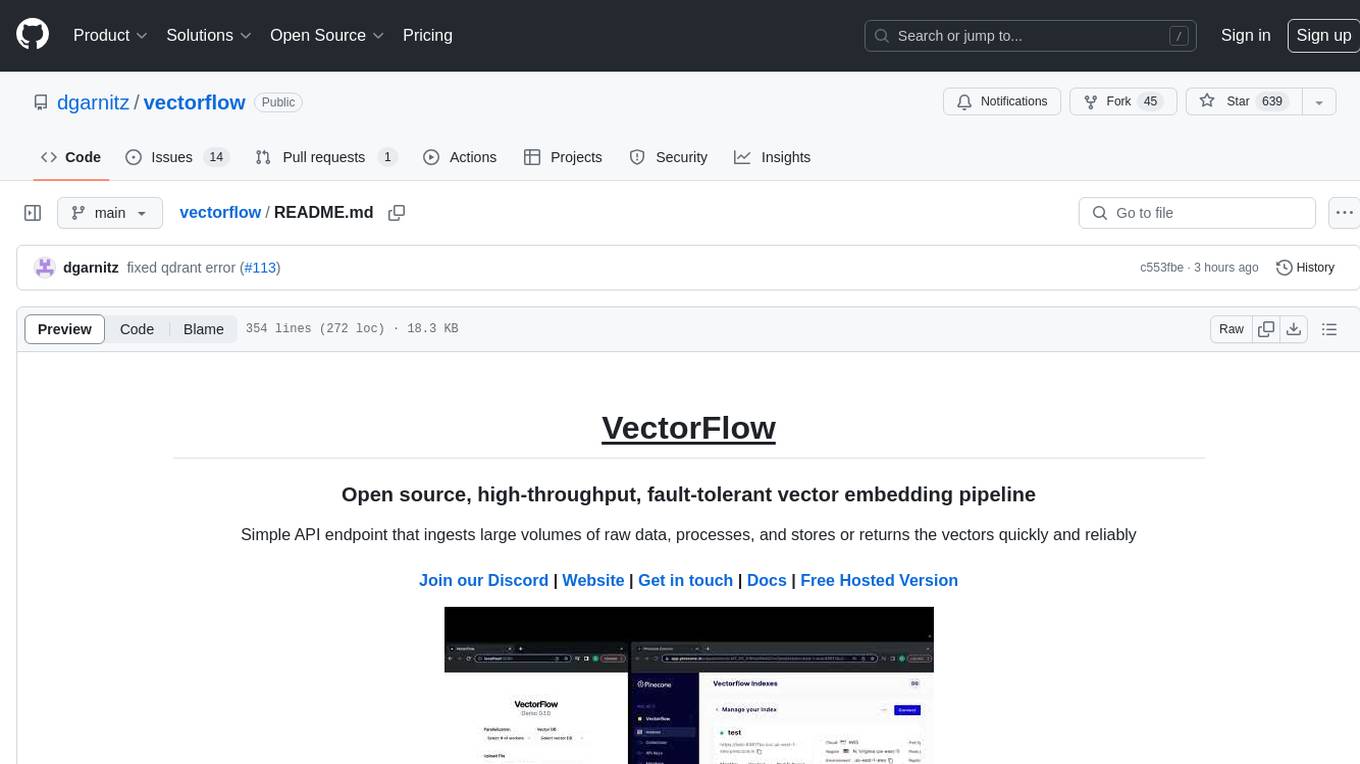
vectorflow
VectorFlow is an open source, high throughput, fault tolerant vector embedding pipeline. It provides a simple API endpoint for ingesting large volumes of raw data, processing, and storing or returning the vectors quickly and reliably. The tool supports text-based files like TXT, PDF, HTML, and DOCX, and can be run locally with Kubernetes in production. VectorFlow offers functionalities like embedding documents, running chunking schemas, custom chunking, and integrating with vector databases like Pinecone, Qdrant, and Weaviate. It enforces a standardized schema for uploading data to a vector store and supports features like raw embeddings webhook, chunk validation webhook, S3 endpoint, and telemetry. The tool can be used with the Python client and provides detailed instructions for running and testing the functionalities.
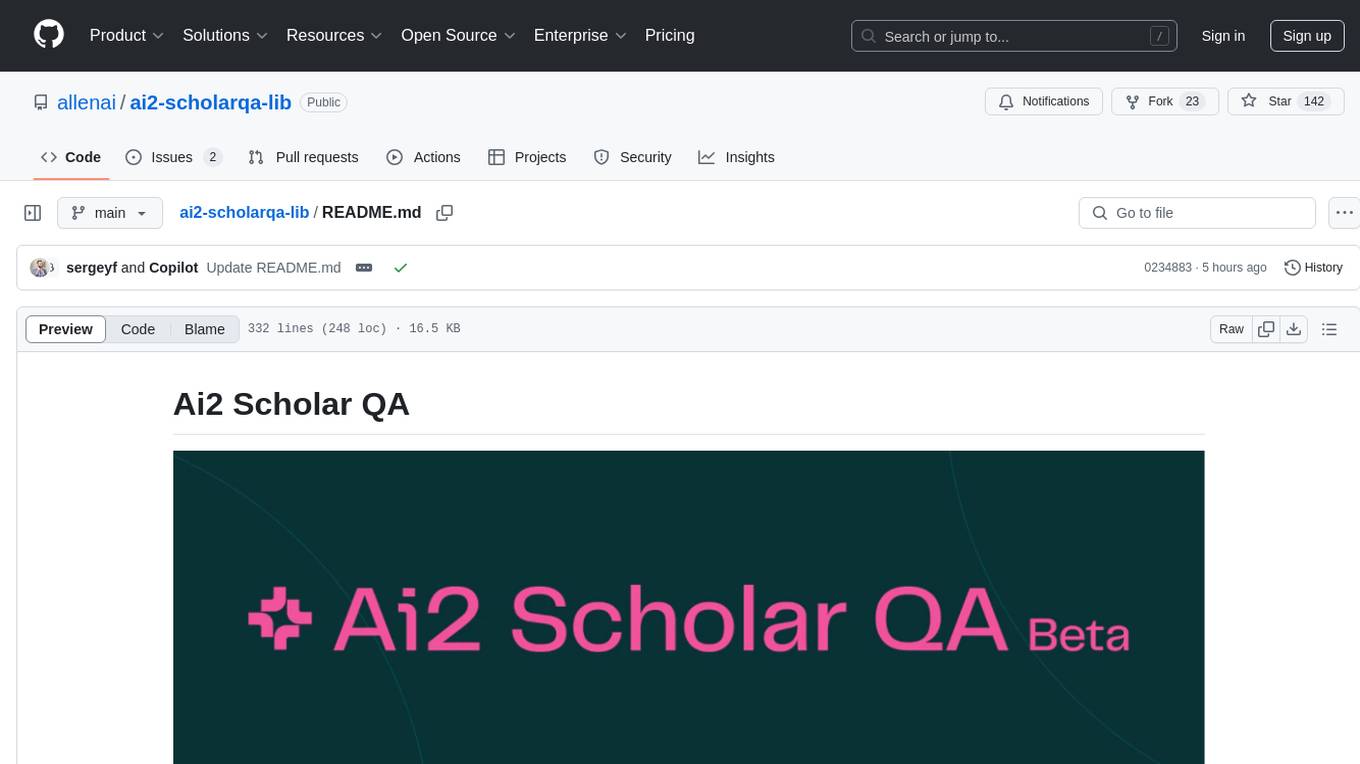
ai2-scholarqa-lib
Ai2 Scholar QA is a system for answering scientific queries and literature review by gathering evidence from multiple documents across a corpus and synthesizing an organized report with evidence for each claim. It consists of a retrieval component and a three-step generator pipeline. The retrieval component fetches relevant evidence passages using the Semantic Scholar public API and reranks them. The generator pipeline includes quote extraction, planning and clustering, and summary generation. The system is powered by the ScholarQA class, which includes components like PaperFinder and MultiStepQAPipeline. It requires environment variables for Semantic Scholar API and LLMs, and can be run as local docker containers or embedded into another application as a Python package.

ain
Ain is a terminal HTTP API client designed for scripting input and processing output via pipes. It allows flexible organization of APIs using files and folders, supports shell-scripts and executables for common tasks, handles url-encoding, and enables sharing the resulting curl, wget, or httpie command-line. Users can put things that change in environment variables or .env-files, and pipe the API output for further processing. Ain targets users who work with many APIs using a simple file format and uses curl, wget, or httpie to make the actual calls.
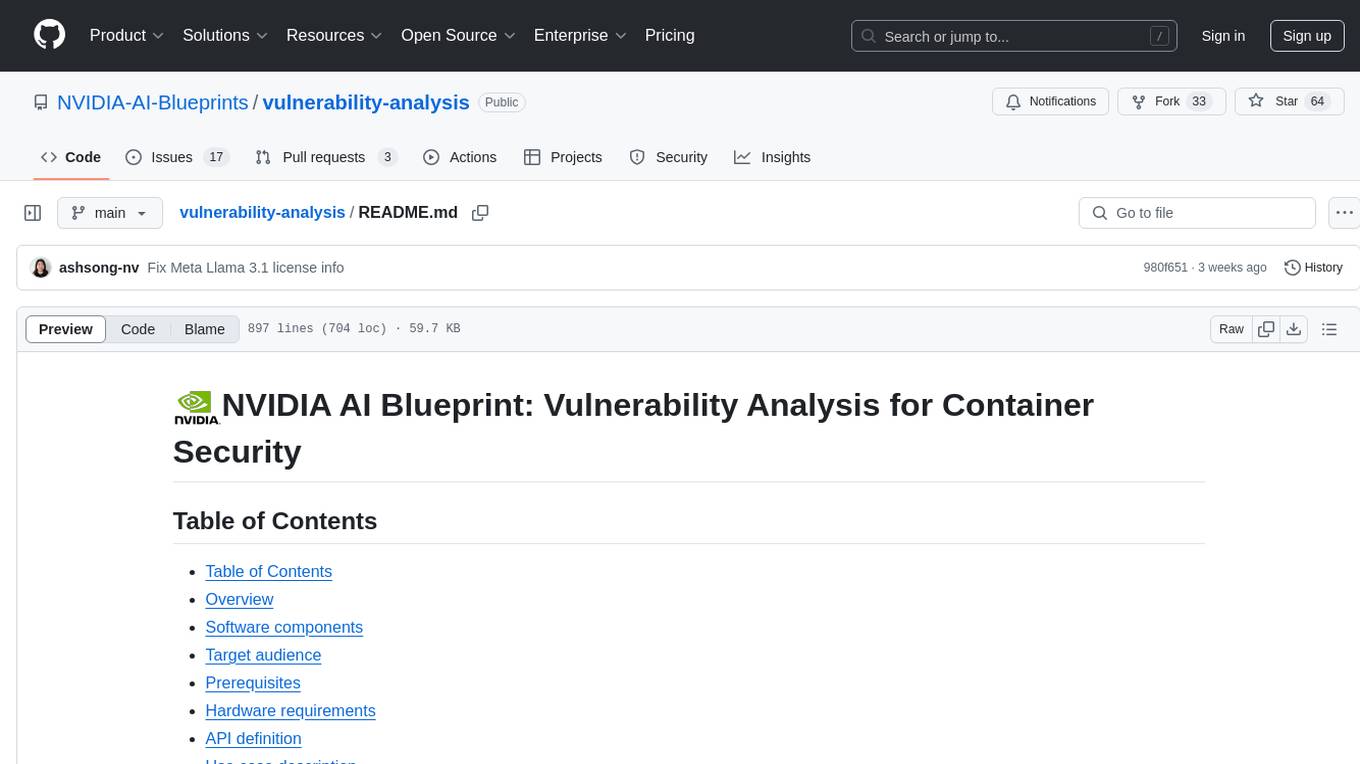
vulnerability-analysis
The NVIDIA AI Blueprint for Vulnerability Analysis for Container Security showcases accelerated analysis on common vulnerabilities and exposures (CVE) at an enterprise scale, reducing mitigation time from days to seconds. It enables security analysts to determine software package vulnerabilities using large language models (LLMs) and retrieval-augmented generation (RAG). The blueprint is designed for security analysts, IT engineers, and AI practitioners in cybersecurity. It requires NVAIE developer license and API keys for vulnerability databases, search engines, and LLM model services. Hardware requirements include L40 GPU for pipeline operation and optional LLM NIM and Embedding NIM. The workflow involves LLM pipeline for CVE impact analysis, utilizing LLM planner, agent, and summarization nodes. The blueprint uses NVIDIA NIM microservices and Morpheus Cybersecurity AI SDK for vulnerability analysis.
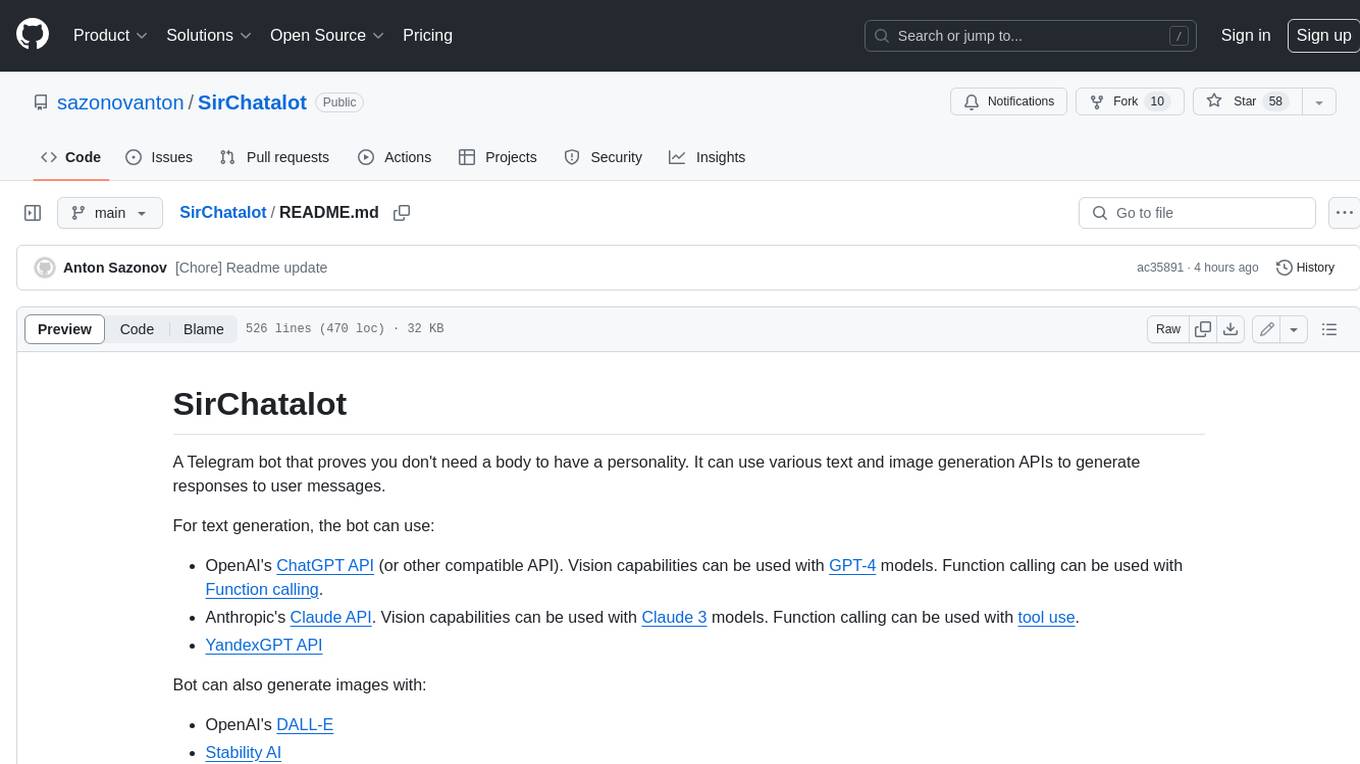
SirChatalot
A Telegram bot that proves you don't need a body to have a personality. It can use various text and image generation APIs to generate responses to user messages. For text generation, the bot can use: * OpenAI's ChatGPT API (or other compatible API). Vision capabilities can be used with GPT-4 models. Function calling can be used with Function calling. * Anthropic's Claude API. Vision capabilities can be used with Claude 3 models. Function calling can be used with tool use. * YandexGPT API Bot can also generate images with: * OpenAI's DALL-E * Stability AI * Yandex ART This bot can also be used to generate responses to voice messages. Bot will convert the voice message to text and will then generate a response. Speech recognition can be done using the OpenAI's Whisper model. To use this feature, you need to install the ffmpeg library. This bot is also support working with files, see Files section for more details. If function calling is enabled, bot can generate images and search the web (limited).
For similar tasks

LeanAide
LeanAide is a work in progress AI tool designed to assist with development using the Lean Theorem Prover. It currently offers a tool that translates natural language statements to Lean types, including theorem statements. The tool is based on GPT 3.5-turbo/GPT 4 and requires an OpenAI key for usage. Users can include LeanAide as a dependency in their projects to access the translation functionality.
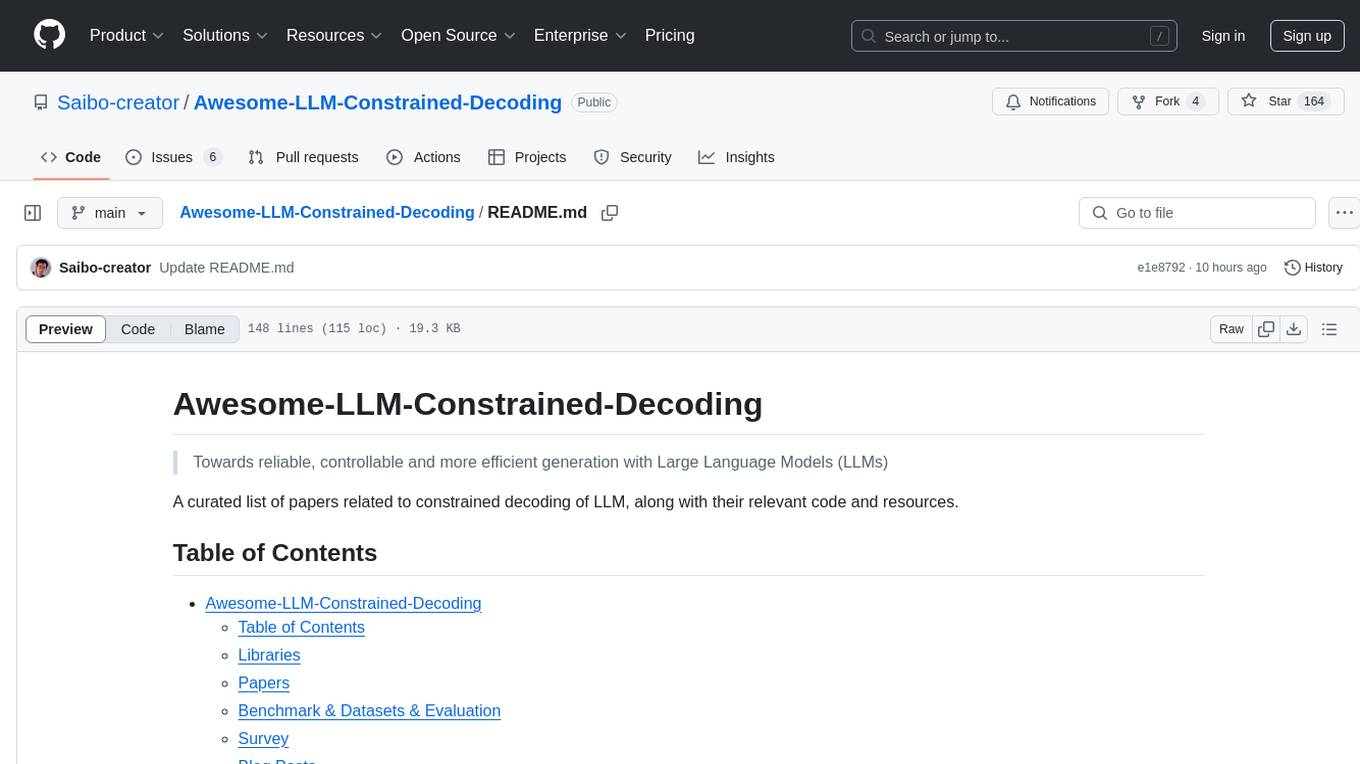
Awesome-LLM-Constrained-Decoding
Awesome-LLM-Constrained-Decoding is a curated list of papers, code, and resources related to constrained decoding of Large Language Models (LLMs). The repository aims to facilitate reliable, controllable, and efficient generation with LLMs by providing a comprehensive collection of materials in this domain.
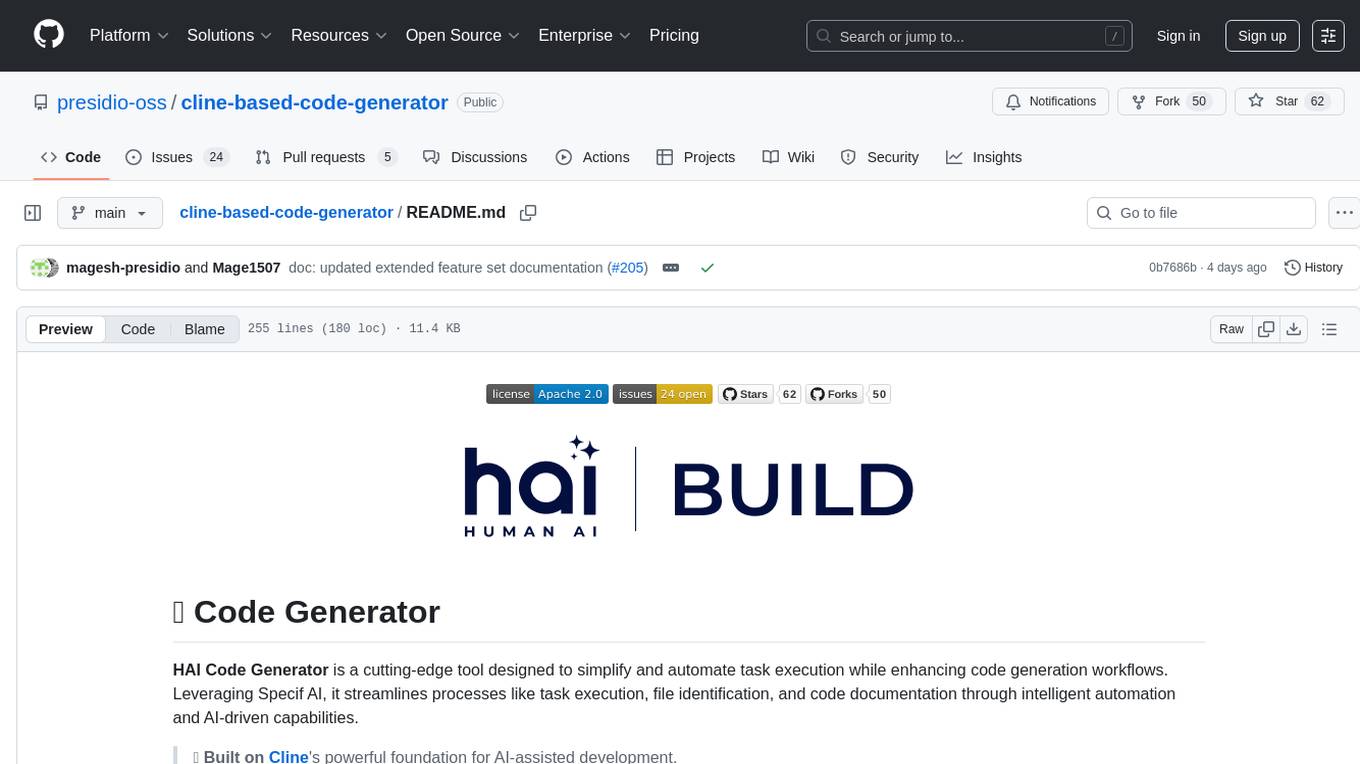
cline-based-code-generator
HAI Code Generator is a cutting-edge tool designed to simplify and automate task execution while enhancing code generation workflows. Leveraging Specif AI, it streamlines processes like task execution, file identification, and code documentation through intelligent automation and AI-driven capabilities. Built on Cline's powerful foundation for AI-assisted development, HAI Code Generator boosts productivity and precision by automating task execution and integrating file management capabilities. It combines intelligent file indexing, context generation, and LLM-driven automation to minimize manual effort and ensure task accuracy. Perfect for developers and teams aiming to enhance their workflows.
For similar jobs

sweep
Sweep is an AI junior developer that turns bugs and feature requests into code changes. It automatically handles developer experience improvements like adding type hints and improving test coverage.

teams-ai
The Teams AI Library is a software development kit (SDK) that helps developers create bots that can interact with Teams and Microsoft 365 applications. It is built on top of the Bot Framework SDK and simplifies the process of developing bots that interact with Teams' artificial intelligence capabilities. The SDK is available for JavaScript/TypeScript, .NET, and Python.

ai-guide
This guide is dedicated to Large Language Models (LLMs) that you can run on your home computer. It assumes your PC is a lower-end, non-gaming setup.

classifai
Supercharge WordPress Content Workflows and Engagement with Artificial Intelligence. Tap into leading cloud-based services like OpenAI, Microsoft Azure AI, Google Gemini and IBM Watson to augment your WordPress-powered websites. Publish content faster while improving SEO performance and increasing audience engagement. ClassifAI integrates Artificial Intelligence and Machine Learning technologies to lighten your workload and eliminate tedious tasks, giving you more time to create original content that matters.

chatbot-ui
Chatbot UI is an open-source AI chat app that allows users to create and deploy their own AI chatbots. It is easy to use and can be customized to fit any need. Chatbot UI is perfect for businesses, developers, and anyone who wants to create a chatbot.

BricksLLM
BricksLLM is a cloud native AI gateway written in Go. Currently, it provides native support for OpenAI, Anthropic, Azure OpenAI and vLLM. BricksLLM aims to provide enterprise level infrastructure that can power any LLM production use cases. Here are some use cases for BricksLLM: * Set LLM usage limits for users on different pricing tiers * Track LLM usage on a per user and per organization basis * Block or redact requests containing PIIs * Improve LLM reliability with failovers, retries and caching * Distribute API keys with rate limits and cost limits for internal development/production use cases * Distribute API keys with rate limits and cost limits for students

uAgents
uAgents is a Python library developed by Fetch.ai that allows for the creation of autonomous AI agents. These agents can perform various tasks on a schedule or take action on various events. uAgents are easy to create and manage, and they are connected to a fast-growing network of other uAgents. They are also secure, with cryptographically secured messages and wallets.

griptape
Griptape is a modular Python framework for building AI-powered applications that securely connect to your enterprise data and APIs. It offers developers the ability to maintain control and flexibility at every step. Griptape's core components include Structures (Agents, Pipelines, and Workflows), Tasks, Tools, Memory (Conversation Memory, Task Memory, and Meta Memory), Drivers (Prompt and Embedding Drivers, Vector Store Drivers, Image Generation Drivers, Image Query Drivers, SQL Drivers, Web Scraper Drivers, and Conversation Memory Drivers), Engines (Query Engines, Extraction Engines, Summary Engines, Image Generation Engines, and Image Query Engines), and additional components (Rulesets, Loaders, Artifacts, Chunkers, and Tokenizers). Griptape enables developers to create AI-powered applications with ease and efficiency.